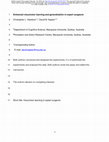Drafts by Christopher L Hewitson

Bioarchive, 2019
Although human motor learning has been intensively studied for many decades, it 20 remains unknow... more Although human motor learning has been intensively studied for many decades, it 20 remains unknown whether group differences are present in expert cohorts that must 21 routinely cope with and learn new visuomotor mappings such as minimally invasive 22 surgeons. Here we show that expert surgeons exhibit greater adaptation and 23 generalization compared to naive controls in a standard visuomotor adaptation task. 24 These findings run counter to a widespread background assumption in the field of motor 25 learning that visuomotor adaptation performance should be largely uniform across the 26 adult human population. Our findings also indicate that differences in basic visuomotor 27 learning capacities, either innate or acquired, might be an important source of difficulty in 28 learning and performing minimally invasive surgery. This information holds potential to 29 guide surgical candidate selection or optimize training programs to address individual 30 needs. 31 32 3 41 hospital stays [3]. Despite these advantages, the task environment in MIS places high 42 demands on surgeons, increasing the difficulty relative to open surgery for both initial 43 learning [4] and ongoing performance [3,5,6]. Since laparoscopic instruments are 44 controlled through small insertion points in the skin, instrument movements are often 45 mirror-reversed and counter-intuitive (e.g., leftward hand motion produces rightward 46 instrument tip motion, and vice versa). Because surgeons receive visual feedback 47
The aim of this work is to elucidate issues pertaining to the property of absolute acceleration.

Uploads
Drafts by Christopher L Hewitson